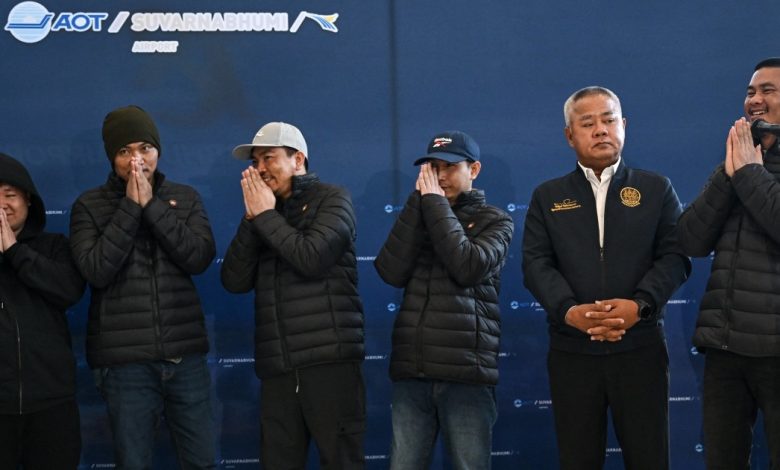5 Thai hostages arrive back home after being released by Hamas

BANGKOK — Five Thai hostages who spent 15 months being held by Hamas arrived in Bangkok early Sunday after they were released last month.
The group, consisting of Sarusak Rumnao, 32, Watchara Sriaoun, 33, Sathian Suwannakham, 35, Pongsak Thaenna, 36, and Bannawat Saethao, 27, was released as part of the hostage-prisoners exchange deal Israel struck with Hamas last month.
They were met at Suvarnabhumi airport by family members as well as Thai Foreign Minister Maris Sagniampongsa and the Israeli ambassador to Thailand, Orna Sagiv, before continuing on to their hometowns in north and northeastern Thailand.
Forty-six Thais were killed in Hamas’s Oct. 7, 2023, terrorist attack on Israel, according to the Thai Foreign Ministry, one of the highest death tolls among foreign nationals. Thirty-one others were taken back to the Gaza Strip as hostages, 23 of whom were released in November 2023 during an early ceasefire. Two other Thai hostages have since been confirmed dead.
Five of the six remaining hostages were released Jan. 31 as part of the second round of releases by the Palestinian militant group in what Thailand’s ambassador to Israel, Pannabha Chandraramya, said was “one of the happiest days of my life.”
After their release they spent a few days in a hospital outside Tel Aviv where they underwent medical tests and recuperated. Family members of four of the hostages met them in Israel on Wednesday, the Thai foreign ministry said in a statement.
They were also visited by a Thai delegation that included the foreign minister.
The status of the remaining Thai hostage, Nattapong Pingsa, is unclear, and Hamas is also still holding the bodies of the two Thai hostages who were confirmed dead.
In addition, Hamas is also holding another foreign national, Nepalese agriculture student Bipin Joshi, as well as the body of a Tanzanian student, Joshua Mollel, who was confirmed dead.
With a population of 9 million, Israel is heavily dependent on foreign labor in sectors such as agriculture, construction and caregiving. While the country has been historically reliant on Palestinian labor, Israel began recruiting foreign workers after the Palestinian revolt that ended in 1993.
Thais arrived in large numbers, drawn by higher wages than they could earn back home, and remain the largest group of foreign agricultural laborers in the country.
Nearly 25,000 Thai workers worked in Israel before the Oct. 7 attack, Chandraramya said.
“They worked tirelessly in the farm, in the kibbutz,” she told reporters last week.
After the attack, many workers fled their jobs in Israel, which began offering higher salaries and launched a recruitment drive in countries including India to secure the critical supply of foreign labor.
Thais have since gone to Israel in bigger numbers than before.
“Most of the Thai workers love to work here,” Chandraramya said, adding that there were now 38,000 workers in the country. “Even more than that before.”





